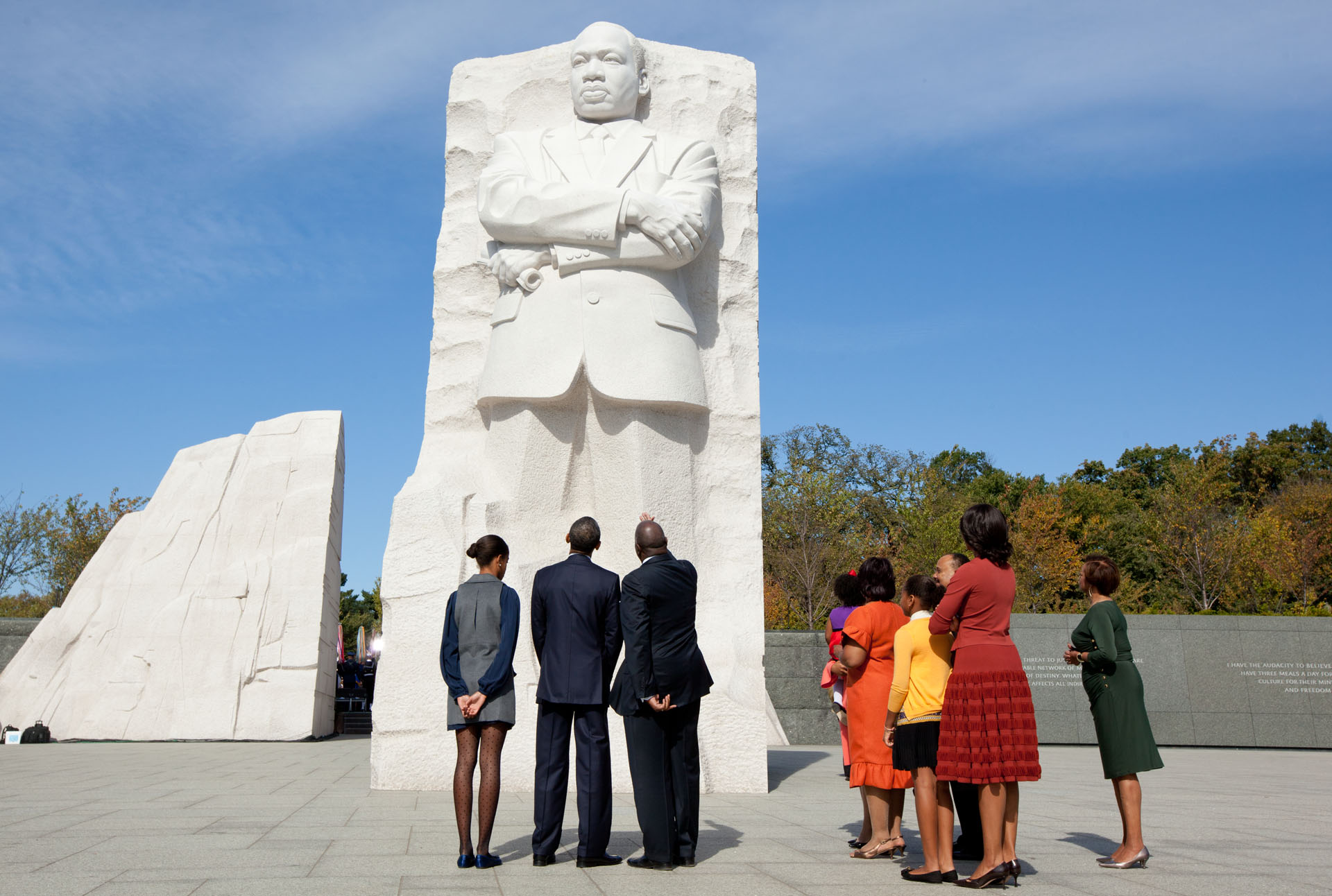
President Obama visiting the new Martin Luther King memorial (Oct., 2011)
(credit: Chuck Kennedy, official White House photo)
On Saturday, a couple of days ago, I wrote about the recent controversy over whether statues of Robert E. Lee should be removed from public spaces in the U.S. I tried to show that while it is reasonable for us to admire Lee's courage and intelligence, we should still highlight at the same time that he made a mistake. Millions of others had made the same mistake in every nation of the world for centuries. Their mistake was that they allowed and supported the institution of slavery in their communities.
As I have said before, slavery is just wrong. Not in the sense that it is evil. Just wrong. My watch can be wrong. A thermometer can be wrong. The speedometer in my car can be wrong. A cancer diagnosis can be wrong. Not evil. Just mistaken.
Lee was making a huge mistake when he gave his support, courage, and intelligence to the cause of the Confederacy. That brief state's main point of contention with the rest of the Union was slavery. The South, by and large, wanted to keep it. The North, by and large, were opposed to it and wanted to see it abolished by law from the whole U.S. They fought and the North won.
But my point on Saturday was that we can admire Lee's courage and intelligence and decide, nevertheless, that he was wrong. We can disagree emphatically with his choices and we can say so in a public way. We can do these things without hating and fighting each other today. One of the crucial features of a democracy is that the people living in a democratic state agree to live by the rule of law. They elect people to represent them in the legislature which writes the laws that every citizen must abide by, and they agree to live by those laws. When they have disputes, they take them to a court of law to get them resolved. They do not take matters into their own hands. Once that vigilante justice begins, it deteriorates into endless revenge killings and rule by the biggest bullies around in the space of less than one generation. A return to the Europe of the Dark Ages. We have been there, done that, and don't want it back. We have learned, mostly, to settle our differences by talking rather than by physical fighting.
So what do we do in a democracy when a division as deep and as darkly, racially motivated as the one in Charlottesville shows its ugly face right out in public?
We engage with the other side in open discussion and debate. This is what democracy takes as one of its given assumptions. If we don't talk about a matter like the racism that is evident in the U.S. (and to varying degrees, in every other nation on earth, by the way), openly and respectfully, it will fester and erupt into violence over and over until we do talk about it.
Therefore, I say again to the proponents of "white" pride and their cohorts (and by the way, I am an old, white male who detests racism of every kind): slavery was wrong as every form of racism is wrong because it is stupid. It causes a society that allows racism to go on to waste some of its best talent. Talent, we know now, is spread over all races, genders, creeds, and ethnicities. It is just smart business for us to learn to accept, respect, and come to like people of all groups in society. Then we are much more likely to get the best person for the job in every case and to build a stronger, more prosperous, more peaceful nation and world.
And we can teach the kids to see past race and gender differences. I used to tell the kids in my classes that someday a teacher in a school somewhere in the world will be working on a Social Studies project with her class about the schools in the U.S., or Canada, or any of a hundred places in the world in the 1960's. One group of students will be looking at copies of the forms that students had to fill out on the first day of school. Name, address, phone number, father's name, mother's name, and so on. That group will come to the teacher with one of the forms and show her one blank space that was supposed to be filled in by every student. Above the blank will be the words "racial/ethnic origin". The children will say to the teacher: "What was this?" And the teacher will say back: "I don't know."
Can we learn to love one another, or at minimum, respect one another? All of us? All over?
Martin Luther King thought so. Gandhi thought so. Nelson Mandela. William Wilberforce. Jesus Christ. Hildegard von Bingen. Jigonsasee. Deganawida. Tolstoy. Herman Hesse. Martin Niemoller. Sun Yat Sen. Mo Tzu. And so many other lovers of humanity who lived and died for decency and sense.
And finally, we need to say plain and simple, again and again: What other choice do we have?
We have nukes now. In the past, we could have wars over these very deluded differences. The past is done. Now, we either learn from it, learn to do better, or we go under for good.
So once again, in the shadow of the mushroom cloud, nevertheless, have a decent, kind day.

Sun Yat Sen, early 20th century Chinese leader and hero
(credit: By JHH755, via Wikimedia Commons)
No comments:
Post a Comment
What are your thoughts now? Comment and I will reply. I promise.